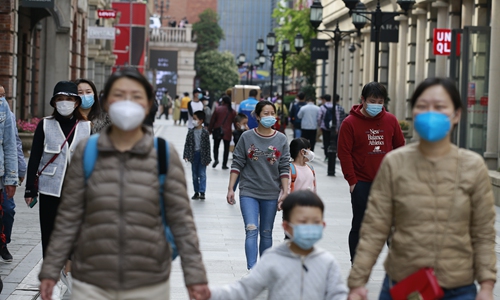
(Photos: Global Times)
The Chinese government's decision to impose lockdown on Wuhan was decisive and China should be thanked for its efforts in fighting COVID-19.
The current disinformation campaign and conspiracy theories are the second pandemic, which would destabilize the joint anti-virus efforts, Richard Horton, editor-in-chief of the UK-based medical journal The Lancet, said in an interview with China Central Television on Friday.
May 1 marked 100 days since Wuhan announced its lockdown. In response to how to evaluate the decision of lockdown, Horton said that China's decision on Wuhan showed that the government acted tremendously and decisively in the face of an acute emergency, and by taking those actions China let the world know how to respond to this pandemic.
"It was not only the right thing to do, but it also showed other countries how they should respond in the face of such an acute threat. So, I think we have a great deal to thank China for how it has handled the outbreak in Wuhan," he said.
The world has been fighting two pandemics in recent months - one is caused by the virus, the other is caused by disinformation. And the pandemic of disinformation is in many ways "as dangerous as the pandemic caused by the virus," Horton said.
Conspiracy theories destabilize efforts to deal with the virus. "It is very important to understand the origins of the virus and to study these origins scientifically, and not allow conspiracy theories to contaminate our thinking," he said.
Many of the conspiracy theories are "laughable" but we do need to take them seriously. Some of the disinformation is very frightening, for example, promoting untested vaccines is dangerous and is a pandemic caused by the media, he noted.
This disinformation is harmful and "we need to be as careful about eradicating rumors as we are in controlling rumors," he said.
Horton thinks it is not very meaningful to find patient zero. Finding the people who spread the virus may cause many problems, including stigmatization and discrimination, which would not be helpful, he said.
"But we do need to understand the origins of the virus," he said, noting that we need to know how the virus jumped from an animal to a human and to avoid the spreading from animals to humans.
It is "most unfortunate" to hear some people are blaming China for the origins of the pandemic. "It is not helpful to blame a country in this way. What we should be doing instead is working as partners with Chinese authorities to understand the epidemic and do what we can to make sure the epidemic does not happen again," Horton said.
"China didn't want this epidemic. China is not responsible for the pandemic." It's happened. The doctors and scientists in China have done "the most tremendous job" to protect people's lives, Horton said.
"For international political leaders to be so critical of China, it is not only unfair but it's plainly incorrect and factually untrue." Horton said that we should be thankful for Chinese doctors and scientists.
Horton said that he hugely admires American science and medicine, and the doctors and scientists leading the response in America are doing a very fine job. People such as Anthony Fauci, who directs the National Institute of Allergy and Infectious Diseases, and Dr Deborah Birx, both of them are very fine individuals.
"What is disappointing is seeing the politicians, who are for example, giving credibility to conspiracy theories, who are promoting treatments that have no evidence to support them, and who unfortunately are damaging the potential prospects of global collaboration by being so openly critical of other countries such as China and organizations such as the World Health Organization. I don't think that's a helpful response," he said.
"What we should be doing is working intensively together to address the challenge of this pandemic. Putting down countries and putting down people is not the way to confront a threat to humanity which this virus is."
Horton said that China has experience from dealing with SARS and has made great investments in public health systems and scientific research. It has medical resources and political capability to deal with the epidemic. However, some European countries did not think this was similar to SARS and did not pay enough attention, which was a serious mistake.
During the interview, Horton repeatedly thanked Chinese medical staff and scientists and said that they should not be criticized but deserve praise.


